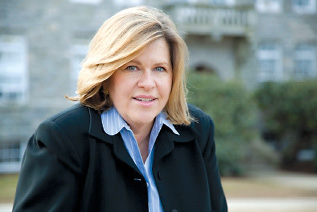Showing a movie in K–12 schools isn’t as easy as simply loading a clip and pushing the play button. That’s because many educators don’t have the right to make copies from commercial DVDs—even for educational use.
 Renee Hobbs (pictured) would like to change that. The founding director of the University of Rhode Island’s Harrington School of Communication and Media, Hobbs has petitioned the U.S. Copyright Office to allow K–12 teachers to make copies from DVDs so they’ll no longer be restricted to using degraded clips and outdated VHS tapes with their digitally-savvy students.
Renee Hobbs (pictured) would like to change that. The founding director of the University of Rhode Island’s Harrington School of Communication and Media, Hobbs has petitioned the U.S. Copyright Office to allow K–12 teachers to make copies from DVDs so they’ll no longer be restricted to using degraded clips and outdated VHS tapes with their digitally-savvy students.
“One important argument we make in this case is that teachers want to be lawful,” says Hobbs. “But we are settling for something that’s not really good enough.”
The issue at hand seems fairly simple. For years, teachers have used movies, TV shows, and even songs to teach everything from democracy in America to photosynthesis by creating files derived from existing media, including VHS tapes. But copying clips from DVDs? It’s not allowed as spelled out in the Digital Millennium Copyright Act, which safeguards the digital rights management around a work against tampering by users. Yet under a provision of the copyright law known as “fair use,” teachers can legally make copies of copyrighted materials if the use of that content offers a benefit greater than the potential harm to the copyright holder.
Enter Hobbs, who, three years ago, went before the Copyright Office to request that K–12 educators be allowed to make copies from DVDs to teach media literacy. College professors had been granted this permission in 2009—but the right did not extend to K–12 teachers.
The response to Hobbs’s petition? “They said you haven’t proved that K–12 teachers or students need access to high-quality clips,” she says.
Hobbs did secure the right for K–12 teachers to make clips from DVDs for the purpose of critical analysis, comment, and criticism. But that didn’t cover all uses that would occur in schools, as in the case of an eighth-grade science teacher seeking multimedia content to teach mitosis. So she’s heading back to make her case this year.
“For this cycle, I narrowed my arguments a bit,” says Hobbs. “It doesn’t make sense that one set of educators should be entitled to fair use and not another. Why would the Copyright Office draw a line between an 18-year-old college student and an 18-year-old high school student?”
Still waiting to learn when she’ll be called to testify, Hobbs isn’t remaining idle. As part of her petition, groups including the Recording Industry Association of America, the Motion Picture Association of America, and the Association of American Publishers have commented and Hobbs has responded in turn.
Junior attorneys from the Glushko-Samuelson Intellectual Property Law Clinic at the Washington College of Law at American University have assisted Hobbs in framing her thesis, brief, and other supporting documents.
“One of the things I don’t think members of the U.S. Copyright Office understand is why a high-quality digital clip makes sense,” says Hobbs. “So I am going to ask a friend who is a social studies teacher to set up a camera in the high school and show what a screen capture looks like with its degraded audio and image. You can go online and download a tool that does bypass the copyright software. There are lots of these tools. They’re legal, just not legal to use. Another irony.”


